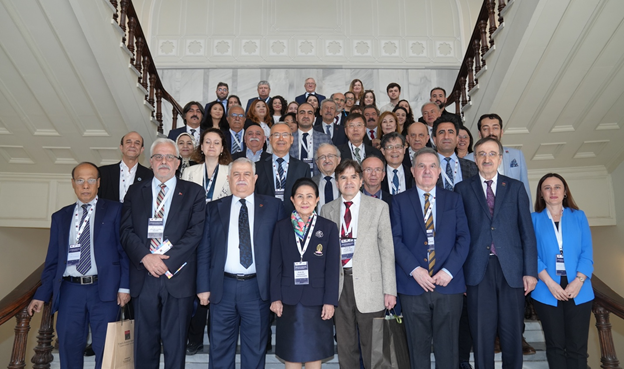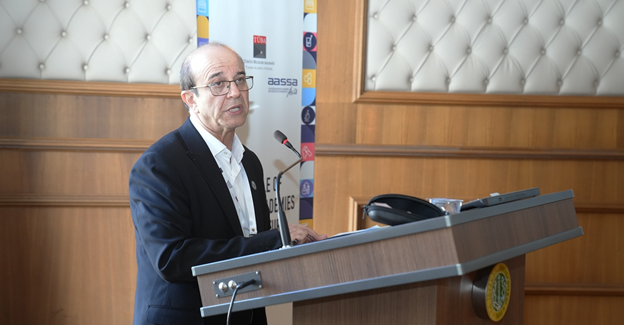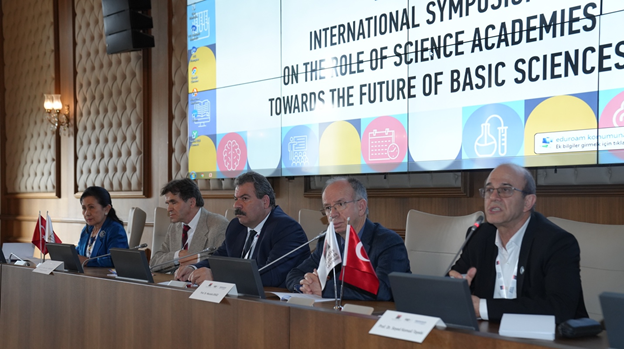President ECOSF participated in International Symposium on The Role of Science Academies Towards the Future of Basic Sciences hosted by TUBA and AASSAA
Go Back

Turkish Academy of Sciences (TÜBA), the Interacademy Partnership (IAP), and the Association of Academies and Societies of Sciences in Asia (AASSA) hosted the International Symposium on "The Role of Science Academies towards the Future of Basic Sciences", which took place in Istanbul, Türkiye, on 28-29 April, 2023.

The symposium covered a range of themes, including the future of basic sciences, the relationship between basic sciences and other fields, sustainability practices in basic sciences, and the role of science academies in basic sciences, among others.
A number of presidents, directors, heads and representatives of scientific academies, centers and universities such as ECOSF, TUBA, TUBITAK, AASSA, IAP, the Research and Application Center for Space and Accelerator Technologies (RACSAT), Hungarian Academy of Sciences, KOICA, KAST (the Korean Academy of Science and Technology), Belarusian Republican Foundation for Fundamental Research (BRFFR), etc. attended the symposium actively.
President ECOSF Professor Seyed Komail Tayebi presented a paper (co-authored with Khalil Raza) on “Role of Basic Sciences in Climate Mitigation” at the second session on 28 April, 2023

President ECOSF highlighted the crucial role of basic sciences in developing solutions for climate mitigation. He emphasized climate change is a global challenge caused by human activities, primarily the burning of fossil fuels and deforestation. Basic sciences, including physics, chemistry, and biology, provide the foundation for understanding the complex science behind climate change.
The ECOSF President mentioned educating the young minds about the climate change is a main challenge of climate change mitigation. Hence, education system must equip learners with the capability of understanding and decision making, based on evidence and critical thought and scientific education, rather than letting opinions or irrationality guide their choices in the future. Additionally, adequate teacher mobilization, science education and support and introduction of climate change education into national science curricula must be planned.
In his presentation, he talked about the impacts of climate change on natural systems, while he added basic sciences provide insights into the impacts of climate change on natural systems, including oceans, forests, and biodiversity. The impacts of climate change on rising sea levels, ocean acidification, and the resulting impacts on marine ecosystems and coastal communities. Basic sciences help us understand how climate change affects forests. Changes in temperature, precipitation patterns, and extreme weather events can disrupt ecosystems, leading to altered habitats, species distribution, and ecological interactions.
President ECOSF also explained Teachers Training Module on climate change that develop a teacher training for science teachers who employs Inquiry Based Science Education (IBSE) pedagogy. This training module aims at delivering effective content on climate change to students of grade 5 through 10. Therefore, an assessment or evaluation methodology for this training is to measure the depth of learning with IBSE pedagogy. This is to demonstrate that inquiry-based approach could offer greater degree of learning and understanding of science concepts and processes in comparison to traditional science teaching methods.
President ECOSF participated in closing session on Symposium Evaluation & Closing Remarks, chaired by Prof. Dr. Ahmet Nuri Yurdusev, while other panelists were Prof. Dr. Supawan Tantayanon, Prof. Dr. Mustafa Ersöz and Prof. Dr. Bekir Salih.

Prof. Tayebi concluded this symposium on "The Role of Science Academies towards the Future of Basic Sciences" was evident that basic sciences play a critical role in addressing the global challenge of climate change. The symposium provided an excellent opportunity and a platform underlining the crucial role of science academies. The symposium provided insights, and best practices in advancing basic sciences and fostering scientific research and innovation. It aimed to explore ways in which science academies can contribute to the future of basic sciences through various initiatives, policies, and collaborations. Some of the key areas of discussion during the symposium were:
- Science academies play a vital role in promoting basic sciences by advocating for their importance, supporting research funding, and raising awareness among policymakers, stakeholders, and the general public. The symposium explored strategies for science academies to effectively communicate the value of basic sciences in advancing scientific knowledge and addressing global challenges.
- Science academies must contribute to the future of basic sciences by nurturing young talent, providing mentorship, and fostering scientific leadership. The symposium discussed ways in which science academies can develop programs and initiatives to promote capacity building, skill development, and career advancement in basic sciences, including fostering diversity and inclusivity.
- Basic sciences often require interdisciplinary approaches and collaborations across different scientific disciplines. The symposium highlighted the role of science academies in facilitating interdisciplinary research, promoting collaborations among scientists from diverse fields, and fostering innovation at the intersection of different branches of basic sciences.
- Science academies should play a critical role in shaping science policy and advocating for evidence-based decision-making. The symposium explored how science academies can engage with policymakers, provide scientific advice, and contribute to the formulation of policies related to basic sciences, including funding, regulations, and ethical considerations.
- Basic sciences are inherently global, with scientists and researchers from different countries collaborating and exchanging knowledge. The symposium discussed ways in which science academies can foster international cooperation, promote partnerships among academies from different countries, and facilitate knowledge exchange to advance basic sciences on a global scale.
- Science academies should also contribute to the future of basic sciences by promoting science education, outreach, and public engagement. The symposium highlighted initiatives undertaken by science academies to promote scientific literacy, engage with the public, and inspire the next generation of scientists.
- Interesting issued, climate change, small scale lab, connectivity, education of climate change and science must be considered for future work plans by scientific academies and centers.
In the end, on the behalf of ECO Science Foundation, Prof. Tayebi expressed his gratitude to TUBA, IAP, and AASSA for organizing this symposium and the organizers for providing me this opportunity for fruitful discussions on the role of science academies towards the future of basic sciences.
During the two days of symposium, Prof. Tayebi met some of esteemed participants such as Prof. Dr. Ahmet Cevat ACAR, President Istanbul Zaim University, Prof. Abdeslam Hoummada, Directeur, Direction des Sciences of Morocco, Dr. Jang, R. Liu, Director of AASSA Secretariat, Prof. Dr. Gabor Hamza, Full member of the Hungarian Academy of Sciences, Prof. Dr. M. Bilge Demirkoz, Director of the Research and Application Center for Space and Accelerator Technologies (RACSAT), Professor Serg, KOICA, KAST (the Korean Academy of Science and Technology), Professor Sergey V. Gaponenko, Chairman of Scientific Council and Director Academician, Belarusian Republican Foundation for Fundamental Research (BRFFR), Prof. Dr. Supawan Tantayanon, Faculty member of Chulalongkom University (Thailand) and former President of Federation of Asian Chemical Sciences (FACS) and Prof. Lee, Mooha, Faculty Member of Seoul National University Fellow, CAST and Executive Board Member of AASSA.